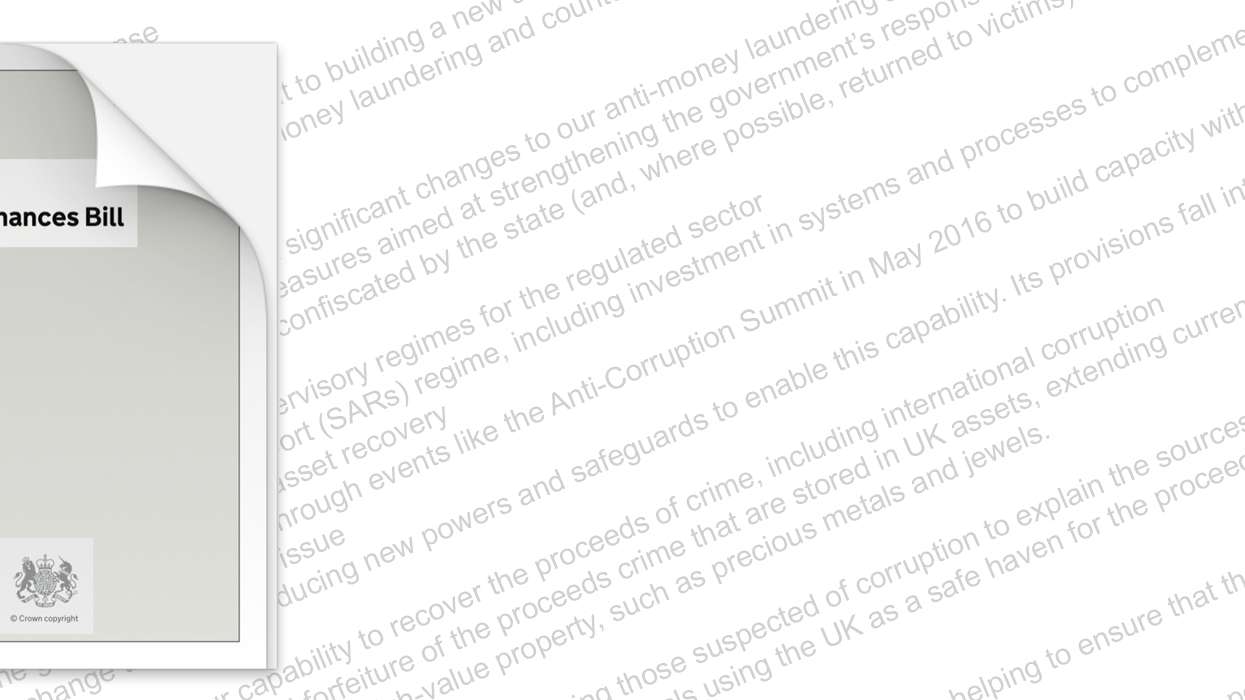The 2016 Criminal Finances Bill (the Bill) represents the conclusion of a series of financial crime measures that have been introduced since the 2015 general election. For example, it builds on the publication of the National Risk Assessment for Money Laundering and Terrorist Financing report in October 2015, the publication of the Action Plan for anti-money laundering and terrorist finance report, the creation of the Panama Papers Task Force, and the 2016 Anti-Corruption Summit in London.
The new Bill aims to introduce a number of measures aimed at improving the ability to investigate and confiscate the proceeds of crime, provisions to improve the use of suspicious activity reports, instruments to tackle the facilitation of tax evasion and amendments to the counter-terrorist financing legislative framework. In this article, I focus on the last of these measures.
Background
The United Kingdom has, over the years, implemented a range of terrorist-related legislation. These measures have been regularly amended in response to the changing threat posed by terrorism.
The two central legislative pillars of the UK’s counter-terrorist efforts were the Northern Ireland (Emergency Provisions) Act 1973 and the Prevention of Terrorism (Temporary Provisions) Act 1974.
These provisions were amended by the Prevention of Terrorism Act 1989 and more recently by the Terrorism Act 2000, which has since become an integral part of the UK’s counter-terrorist financing strategy.
These measures were further expanded following the 2001 terrorist attacks by the Anti-terrorism, Crime and Security Act 2001, the Counter-Terrorism Act 2008 and the Terrorist Asset-Freezing (Temporary Provisions) Act 2010.
Criminal Finances Bill
The Bill introduces a number of amendments to the UK’s terrorist financing legislation which are outlined below.
Information sharing
The Bill allows firms in the regulated sector to share information with each other in order to ascertain a more accurate overview of how money launderers and the financiers of terrorism operate. Clause 30 allows for the voluntary sharing of information between members of the regulated sector, the police and the National Crime Agency (NCA) in connection with suspicions about terrorist financing, or the identification of terrorist property or its movement or use.
Seizure and forfeiture powers – for bank accounts and mobile stores of value
The Proceeds of Crime Act 2002 permitted law enforcement agencies to seize and forfeit criminal cash. However, law enforcement agencies are sometimes prevented from being able to gain access to the proceeds of crime in bank accounts and other assets such as precious metals.
Clause 32 of the new Bill allows for the seizure and recovery of illegal assets, where they are “intended to be used for the purposes of terrorism, or consists of resources of an organisation which is a proscribed organisation, or where property which is earmarked as terrorist property”. Additionally, Clause 33 permits the freezing and forfeiture of bank and building society accounts, where those accounts contain monies which are intended to be used for terrorism as well as the resources or monies of a proscribed organisation.
Disclosure orders
Clause 29 of the Bill contains proposals to introduce disclosure orders in association with investigations into terrorist financing offences. A disclosure order is an “order authorising an officer to give anyone he thinks has relevant information a written notice requiring that person to answer questions, provide information or to produce documents on any matter that is relevant to the confiscation investigation.”
This is an important extension to powers under the Terrorism Act 2000 and the Anti-Terrorism, Crime and Security Act 2001, which are currently only available to constables, but that now is also available to civilian Accredited Financial Investigators (AFI) who are often employed by the police.
This is a welcome amendment to the Terrorism Act 2000 for a number of reasons. For example, it increases the capacity of the police to apply for court orders. Inquiries into allegations of terrorist financing are commonly supported by civilian AFI in the police, but their impact until now has often been limited by restrictive investigative powers. The government claims that allowing AFI’s to use specific financial investigation tools will provide the police with more freedom to concentrate on other aspects of their investigations.
What difference could it make?
The Criminal Finances Bill proposes to make a number of small but important changes to the UK’s terrorist financing legislation. The ability of the regulated sector to exchange information is to be welcomed and it could lead to providing a more detailed and accurate picture of how the financiers of terrorism operate.
The extension of the seizure and forfeiture powers to target money in bank accounts and other assets is another welcome proposal, recognising that terrorists are able to access funds from a wide range of sources. The introduction of disclosure orders are an extension of existing powers under the Proceeds of Crime Act 2002.
Overall, the indications are that these proposals will provide law enforcement agencies with more mechanisms to tackle the financiers of terrorism.
Copyright Information
As part of CREST’s commitment to open access research, this text is available under a Creative Commons BY-NC-SA 4.0 licence. Please refer to our Copyright page for full details.






